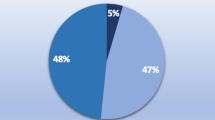Abstract
Objectives
The purpose of this study was to analyse the extent to which breast cancer patients excuse inconveniences that occur during their hospitalisation, and how this “tendency to excuse” affects their satisfaction with the hospital stay.
Methods
Breast cancer patients undergoing treatment at one of 51 breast centres in North Rhine-Westphalia (Germany) in 2009 were asked to complete the Cologne Patient Questionnaire-Breast Cancer (CPQ-BC). For the analyses, the “tendency to excuse” scale was subdivided into three groups. Linear regressions were performed to investigate associations between the “tendency to excuse” and patient satisfaction.
Results
88 % (3,950) of the patients completed the questionnaire. The results show that the inpatients excused inconsistencies to a moderate degree. The “excusers” and “non-excusers” showed greater satisfaction with hospital services than the “medium-excusers”.
Conclusions
The “tendency to excuse” scale could aid future data analysis of patient satisfaction surveys by identifying patients who are more likely to answer in an unbiased fashion. According to hospital survey outcomes, adjusting for the “tendency to excuse” scale however, does not lead to substantially different results when comparing health care providers.

Similar content being viewed by others
References
Agoritsas T, Lubbeke A, Schiesari L, Perneger TV (2009) Assessment of patients’ tendency to give a positive or negative rating to healthcare. Qual Saf Health Care 18:374–379. doi:10.1136/qshc.2008.028175
Albert US (2008) Stufe-3-Leitlinie Brustkrebs-Früherkennung in Deutschland. W. Zuckschwerdt Verlag, München
Bagozzi RP (1980) Causal models in marketing. Wiley, New York
Dannenmaier G (2012) Über KTQ.—KTQ, Kooperation für Transparenz und Qualität im Gesundheitswesen. http://www.ktq.de/. Accessed 12 May 2012
Dillman DA (1978) Mail and telephone surveys: the Total Design Method. Wiley, New York
Drain M (2001) Quality improvement in primary care and the importance of patient perceptions. J Ambul Care Manage 24:30–46
Edwards C, Staniszweska S, Crichton N (2004) Investigation of the ways in which patients’ reports of their satisfaction with healthcare are constructed. Sociol Health Illn 26:159–183. doi:10.1111/j.1467-9566.2004.00385.x
Giebel GD, Groeben N (2008) Social desirability in the measuring of patient satisfaction after treatment of coloproctologic disorders: on shortcomings of general bipolar satisfaction scales for quality management. Langenbecks Arch Surg 393:513–520. doi:10.1007/s00423-008-0310-x
Hargraves JL, Wilson IB, Zaslavsky A, James C, Walker JD, Rogers G, Cleary PD (2001) Adjusting for patient characteristics when analyzing reports from patients about hospital care. Med Care 39:635–641
Haynes SR, Lawler PG (1995) An assessment of the consistency of ASA Physical Status Classification allocation. Anaesth 50:195–199. doi:10.1111/j.1365-2044.1995.tb04554.x
Heje HN, Vedsted P, Sokolowski I, Olesen F (2008) Patient characteristics associated with differences in patients’ evaluation of their general practitioner. Health Serv Res 8:178–190. doi:10.1186/1472-6963-8-178
Hekkert KD, Cihangir S, Kleefstra SM, van den Berg B, Kool RB (2009) Patient satisfaction revisited: a multilevel approach. Soc Sci Med 69:68–75. doi:10.1016/j.socscimed.2009.04.016
Kowalski C, Wuerstlein R, Steffen P, Harbeck N, Pfaff H (2010) Four years of surveying patients as part of the certification/re-certification of breast centers in North Rhine-Westphalia = Vier Jahre Patientinnenbefragung im Rahmen der (Re-)Zertifizierung der Brustzentren in Nordrhein-Westfalen. Senol Z Mammadiagn -ther 7:24–28. doi:10.1055/s-0030-1247275
McGrath BM, Tempier RP (2003) Implementing quality management in psychiatry: from theory to practice-shifting, focus from process to outcome. Can J Psychiatry Rev Can Psychiatr 48:467–474
Nguyen Thi PL, Briançon S, Empereur F, Guillemin F (2002) Factors determining inpatient satisfaction with care. Soc Sci Med 54:493–504
O’Malley AJ, Zaslavsky AM, Elliott MN, Zaborski L, Cleary PD (2005) Case-mix adjustment of the CAHPS Hospital Survey. Health Serv Res 40:2162–2181. doi:10.1111/j.1475-6773.2005.00470.x
Owens WD, Felts JA (1978) ASA Physical Status Classification: a study of consistency of ratings. Anaesth 49:239–243
Perneger TV (2004) Adjustment for patient characteristics in satisfaction surveys. Int J Qual Health Care 16:433–435. doi:10.1093/intqhc/mzh090
Pfaff H, Freise DC, Land A, Scheibler F, Tual E (2002) Entschuldigungstendenz und das Phänomen der hohen Patientenzufriedenheit: erste Ergebnisse der “Kölner Patientenstudie”. Gesundheitswesen 62:1112
Pfaff H, Freise DC, Mager G, Schrappe M (2003) Der Kölner Patientenfragebogen (KPF): Entwicklung und Validierung eines Fragebogens zur Erfassung der Einbindung des Patienten als Kotherapeuten. Asgard- Verlag, Sankt August
Pfaff H, Kowalski C, Alich M, Knöller R (2009) Ergebnisse der Patientenbefragung 2009. Institute for Medical Sociology, Health Services Research and Rehabilitation Science, University of Cologne
Scheibler F, Janßen C, Pfaff H (2003) Shared decision making: ein Überblick über die Internationale Forschungsliteratur. Soz Praventiv Med 48:11–23. doi:10.1007/s000380300002
Shaw C, Kalo I (2002) A background for national quality policies in health systems. World Health Organization, Copenhagen
Sitzia J (1999) How valid and reliable are patient satisfaction data? An analysis of 195 studies. Int J Qual Health Care 11:319–328. doi:10.1093/intqhc/11.4.319
Sobin LH, Gospodarowicz MK, Wittekind Ch (2009) TNM Classification of Malignant Tumours (UICC International Union against Cancer). Wiley- Blackwell, London
Steffen P, Ommen O, Pfaff H (2008) Die “Entschuldigungstendenz” bei Krankenhauspatienten. Gesundheitswesen 70:532–540. doi:10.1055/s-2008-1080930
Steffen P, Ommen O, Pfaff H (2009) Reduced patient demands in hospitals and their determinants. Int J Public Health 54:11–22. doi:10.1007/s00038-008-7058-5
Conflict of interest
The authors declare that they have no conflict of interest.
Ethical standards
The authors declare that this study complies with the current laws of Germany. The study received ethical approval from the Ethics Committee of the Medical Faculty of the University of Cologne.
Author information
Authors and Affiliations
Corresponding author
Electronic supplementary material
Below is the link to the electronic supplementary material.
Rights and permissions
About this article
Cite this article
Davoll, S., Kowalski, C., Kuhr, K. et al. “Tendency to excuse” and patient satisfaction of those suffering with breast cancer. Int J Public Health 58, 385–393 (2013). https://doi.org/10.1007/s00038-012-0405-6
Received:
Revised:
Accepted:
Published:
Issue Date:
DOI: https://doi.org/10.1007/s00038-012-0405-6




